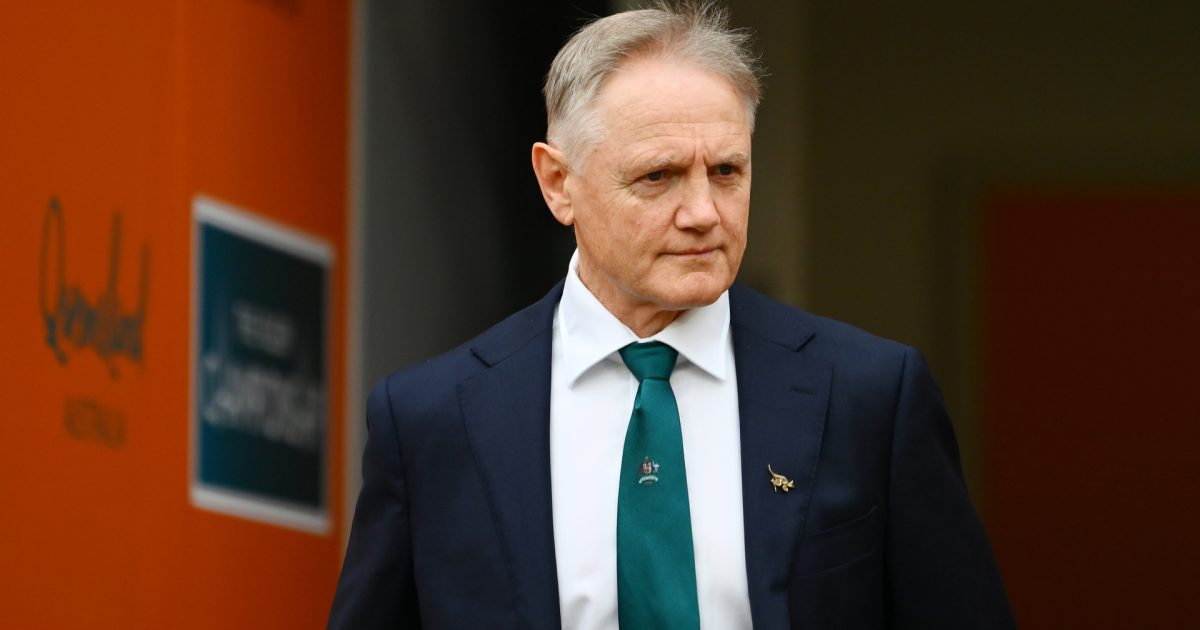What fuels Joe Schmidt’s ‘confidence’ before clash with new-look Springboks

Coach Joe Schmidt has explained what gives him confidence going into the Wallabies’ second clash with the world champion Springboks in as many weeks. Australia have made a handful of changes to the starting team that was beaten 33-7 in Brisbane last weekend.
When the full-time whistle sounded at Suncorp Stadium last Saturday, the scoreline accurately reflected the vast gap between the two sides. Australia barely fired a shot as South Africa snapped their Brisbane hoodoo with a masterful display.
Captain Siya Kolisi led by example, which included a try inside the opening 10 minutes, and the rest of the Springboks seemed to thrive on the back of that. With the visitors up 21-nil going into the break, the match already seemed all but over.
The Wallabies are hurting. They were visibly disappointed with the result last weekend and they’ll be desperate to make amends with an improved performance against the same foe at Perth’s Optus Stadium in a couple of days’ time.
Angus Bell, Nic White and Marika Koroibete all come into the starting side as three of the more significant changes to this Australian outfit chasing a performance they can be happy with. While the Wallabies are firm underdogs, Joe Schmidt is confident they can be better.
“It’s a balance. You can’t just come in with a stick and say, ‘Everything’s wrong.’ We created some nice space and did get through them a few times and outside them a couple of times. We’ve got to take confidence from that,” Joe Schmidt told reporters at the team’s hotel on Thursday afternoon.
“We missed a couple of kicks… a couple of lineouts, one five-metre one that we overthrew that they came back running and got to the halfway. We got punished for anything that we were inaccurate with.
“What gives me confidence is if we can tighten our accuracy, it allows us to be more proactive physically because a lot of our contest areas, it was them bringing the physically on the front foot, even if we had the ball. It was very hard to breathe at times and that’s exactly how they like it.”
South Africa have made 10 changes to the starting side that emerged victorious last weekend, with Pieter-Steph du Toit and Elrigh Louw the only survivors from the forward pack. Cheslin Kolbe, Sacha Feinberg- Mngomezulu and Jesse Kriel are the three others backing up.
Coach Rassie Erasmus was adamant earlier this week that it wasn’t a sign of “disrespect” towards Australia for the South Africans to pick such a changed lineup. This is a tough challenge for the squad’s depth, but that’s been the key to their success in years gone by.
“They don’t need the ball to attack you. At the same time, I’d have to say they attacked pretty well with the ball and bringing Lukhanyo Am in to 12, he’s got that short kicking game, that’s a real weapon,” Schmidt continued.
“Obviously, (Makazole) Mapimpi on the wing. (Aphelele) Fassi at the back, a bit more of a big-strong running game as opposed to the distribution that Willie le Roux has.
“The game that Sacha (Feinberg-Mngomezulu) brought last week, I thought was pretty impressive. I thought we shut him down one time and it was out the back of the hand and on a plate for the guy outside him. Those sort of things, those intangibles, they do make the job of shutting them down quite difficult.
“If we can be accurate and make better use of our opportunities, and that discipline in the first half, I thought we were unlucky a few times but that’s going to happen sometimes and we can’t stack penalties on top of penalties and allow them into the corner or allow them an easy three points when I feel like it could be a tough struggle if the weather is what we expect it to be.”
While the odds still appear firmly stacked against the Wallabies, Schmidt is looking forward to seeing what fresh faces can do in the First XV.
Angus Bell is set for his first rugby match since April after overcoming a toe injury that sidelined the prop for most of Super Rugby Pacific. The front rower will pack down alongside hooker Josh Nasser and captain Allan Alaalatoa up front.
Queenslander Angus Blyth comes into the run-ons side along with Lukhan Salakaia-Loto in the middle row. The loose forwards remain unchanged from last week with Rob Valetini joining Carlo Tizzano and Harry Wilson in that trio.
Test veteran Nic White will join former ACT Brumbies teammate Noah Lolesio in the halves. They have some real attacking weapons outside them including Hunter Paisami, Len Ikitau, Marika Koroibete, Andrew Kellaway and Tom Wright.






























Rassie is not showing the Wallabies any disrespect at all. He is planning towards the 2027 RWC plus he has a large squad of excellent tried and tested RWC winners and newer inexperienced but highly promising youngsters. He wants to give everybody a chance to show their worth with a view to playing the All Blacks In South Africa. With the Perth test Rassie is in a win-win situation. He has named a less experienced but exciting young team but with a wonderful replacement bench. If the Boks win then his aim of checking the reserve depth will be realised. If they lose then they can point out that this was not the A team but possibly a non A side. Rassie is not the best rugby coach in the world for nothing. I still think the Boks will beat this improved Wallabies outfit though. Roll on Saturday and Perth.